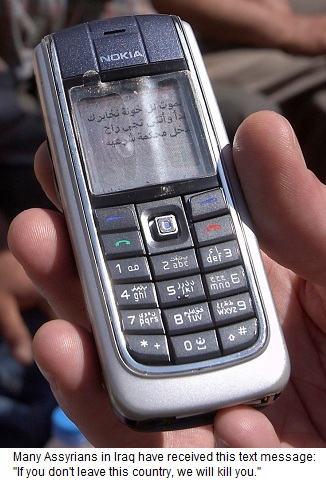Assyrian Rights Group Releases 2011 Report on Assyrians of Iraq
Posted 2012-03-15 22:00 GMT


 Editor's note: The Assyria Council of Europe (ACE), based in Brussels, is an independent organization that monitors and reports on the plight of Iraq's Assyrians (also known as Chaldeans or Syriacs). The following is the introduction from their 2011 report titled Human Rights Report on Assyrians in Iraq: The Exodus from Iraq.
Editor's note: The Assyria Council of Europe (ACE), based in Brussels, is an independent organization that monitors and reports on the plight of Iraq's Assyrians (also known as Chaldeans or Syriacs). The following is the introduction from their 2011 report titled Human Rights Report on Assyrians in Iraq: The Exodus from Iraq.
The rich and colourful diversity that used to signify Iraqi culture and its historical roots are severely threatened at the dawn of the 21st century. Iraq's road to stability is blocked by a flaring conflict between a resurgent Shi'ite majority and a humiliated Sunni minority as well as from the expansionist aspirations of an over-confident Kurdish administration in North Iraq. Given the huge exodus of minorities and continuing threats and violence in 2011, there is a genuine worry that Assyrians (also known as Chaldeans and Syriacs) in Iraq may not survive the current conflict and that their unique culture and heritage will slowly disappear from Iraq. Despite a general decrease of violence in 2011, Assyrians and other minorities are constantly experiencing targeted violence, threats and intimidation. They do not have their own militias to defend them and do not receive effective protection or justice. In addition, minorities are also subjected to a pattern of official discrimination, marginalisation and neglect, and suffer from the effects of corruption and a policy based on sectarian interests. Assyrians perceive that they do not belong to the current Iraq and that they are being excluded from civil society. Because of the continuing displacement processes, many Assyrians are not able to sustain themselves, lacking a regular source of income, opportunities and education, and neither the Kurdish Regional Government (KRG) nor the central Iraqi government provides sufficient assistance. In addition to the lack of life opportunities, especially in the KRG region and in the Nineveh Plains, Assyrians and other minorities experienced a significant rise in hostile acts and riots inside the KRG boundaries in 2011 compared to 2010. Feeling desperation, Assyrians have become restless people moving from one place to the other, and often express the desire to emigrate. The huge exodus that has taken place since 2003 marks the biggest threat to the survival of minorities in Iraq. More than half of the Assyrian community has left Iraq since 2003: From more than 1.5 million Assyrians, the Assyrians population is estimated at approximately 500,000 today. According to the United Nations High Commissioner for Refugees (UNHCR), minorities make up more than 30 per cent of the 2 million Iraqi refugees seeking sanctuary in Jordan, Syria and across the world; the majority of these are Assyrian Christians. Moreover, they represent an enormously disproportionate number of Internally Displaced Persons (IDPs) in Iraq. Hundreds of thousands of refugees who moved to neighbouring countries remain trapped in poverty and chronic uncertainty. Unable to return home or to resettle elsewhere, many face growing desperation with each passing year in exile. This report highlights the situation of the Iraqi Assyrian population in the year 2011, and tries to find an answer to the question why Assyrians have been emigrating from Iraq, shedding light on the conditions under which minority people were living in Iraq of 2011. ACE documented dozens of attacks, and revealed patterns of structural discrimination against Assyrians and their organizations during 2011. As a result of the continuing violence at least 9 people were killed. Every week seven people were wounded in attacks targeting Assyrians. Six Assyrians were abducted; eight attempts were made to bomb churches and kill as many parishioners as possible. This kind of violence is aimed at causing fear and exodus, destroying minorities' social infrastructure and depriving them of their means of subsistence.

or register to post a comment.